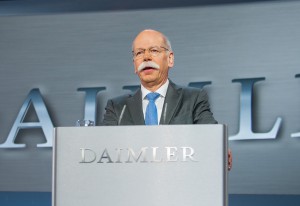
Dieter Zetsche, CEO of Daimler AG, tells shareholders about Mercedes' plans for selling vehicles over the Internet.
Mercedes-Benz is edging into selling cars on the internet, Daimler AG Chief Executive Officer Dieter Zetsche told shareholders during the maker’s annual meeting in Berlin, highlighting the automaker’s forward-looking approach to new challenges and technology.
“For a long time, people believed that you couldn’t sell cars on the internet. After all, a car is different than a book. But nowadays many people are even meeting future husbands and wives online – so why not their new car,” Zetsche said.
Consequently, Mercedes has launched pilot projects in Hamburg and Warsaw, that allows the automaker, through its online store, to enter into a dialogue with people who had previously had little or no contact with a Mercedes dealership, he said.
“Last year we had approximately a quarter of a million contacts with potential customers,” he noted. “Many of them made an appointment for a test drive and some of them also bought their cars online.”
“We are a time-honored company and we are proud of that. But we are also proud of the fact that our engineers don’t get nostalgic, on the contrary, they are primarily curious,” noted Zetsche, who added the company wasn’t offended when it was described as part of the old economy.
“It’s also why we don’t feel threatened when companies from the so-called New Economy try to gain a foothold in the future,” he said. “The fact that many IT companies are showing an interest in the automobile business is not a threat. Instead, it is a confirmation of our belief that the automotive industry is a future-oriented industry.”
“We have achieved a lot at Daimler but we’re aiming for more,” added Zetsche. By and large shareholders seemed to agree as the value of Daimler’s share climbed by 30% and the annual dividend as raised by 20 euro cents per share to 2.45 euros per share, the highest level in Daimler’s history.
“With autonomous driving, we will gain freedom to use our time on the road as we like. That’s the future of automotive luxury,” noted Zetsche, adding the advantages of autonomous driving, will become reality in the next decade.
Partially autonomous driving is already possible in the C-, E- and S-Class of Mercedes-Benz.
“Even when our vehicles are one day able to drive autonomously – they won’t sell themselves autonomously,” Zetsche said.
Zetsche also told shareholders that China still a key area for action.
(Mercedes jumping into pickup truck market. For more, Click Here.)
In 2014, 27% more automobiles from Mercedes-Benz and smart were delivered to customers there than in the previous year. “This year will be even better – with significantly more than 300,000 cars sold,” Zetsche said.
In order to make even better use of the opportunities, Daimler will expand the range of financial services it offers in China and will further enhance its service quality.
“Of course China is not a country of unlimited potential, but it does offer us tremendous opportunities. For example, it’s remarkable how many Chinese customers already buy a premium model as their first automobile: In fact, for 35% of our customers in China, the C-Class is the first car they’ve ever owned,” Zetsche said.
(Click Here for a first look at the 2016 Mercedes-Benz GLE.)
Zetsche said product diversity will continue to grow in the coming years; the number of basic models alone has already increased nearly tenfold since 1970.
“Our portfolio is becoming increasingly complex. That’s why our production has to become more and more flexible,” Zetsche said.
The main preconditions for this are four vehicle architectures on which a number of models are based, as well as producing in or close to the sales markets.
One example for this is the Mercedes-Benz C-Class, which is produced in Germany, the United States, South Africa and China. Daimler continues to rely on the German production sites, for which so-called »future pictures« are now being worked out, he said.
(To see more about the new Porsche Boxster Spyder, Click Here.)
By 2020 for example, 1.5 billion euros will be invested in the Sindelfingen facilities, which celebrated its 100-year jubilee last week, and about 1 billion euros will be invested in the truck plant in Wörth for the expansion of production equipment.
Plug-in hybrids currently offer the best solution for environmentally friendly cars. For this reason, the Group will launch a new plug-in hybrid on average every four months until 2017.
“This is Daimler’s path towards sustainable mobility: We want to have attractive technology platforms, not austerity mobiles,” Zetsche said.

Online sales are a natural – if executed properly. Many people HATE the gamesmanship of buying a car. This is where online sales could be a good thing if consumers can buy the exact car that they want at a fair price and not have to deal with the add-ons they don’t want including pressured financing and other options.
There are drawbacks to internet sales however. Most authorized dealers feel they have been cut out of the profit from an internet sale and thus are unwilling to service cars sold directly from the manufacturer. Car makers will need to address this issue as poor service, especially warranty service, will kill sales and brand loyalty.